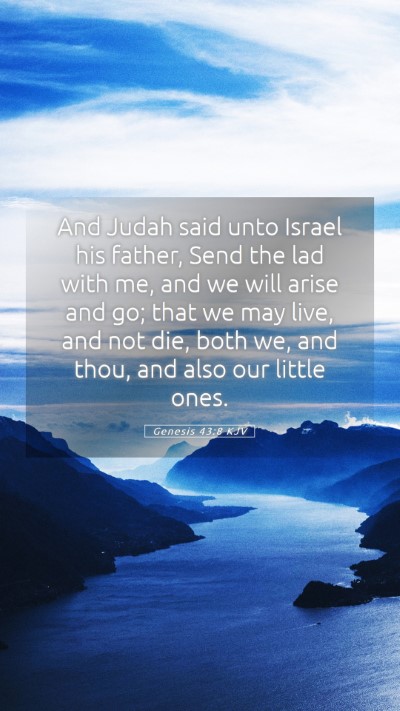Understanding Genesis 43:8 - A Comprehensive Bible Verse Commentary
Genesis 43:8 states: "And Judah said unto Israel his father, Send the lad with me, and we will arise and go; that we may live, and not die, both we, and thou, and also our little ones."
This verse unveils pivotal themes concerning family responsibility, self-sacrifice, and the emotional dynamics woven throughout the Joseph narrative.
Key Themes and Insights
- Family Responsibility: Judah's plea to his father illustrates a deep sense of duty and care for the family’s well-being. In this moment, Judah steps up as a leader, compelling their father to make a decision that weighs heavily on their survival.
- Self-Sacrifice: Judah’s willingness to take Benjamin with him underscores the importance of personal sacrifices for the greater good of the family. By placing his own safety on the line, Judah shows a willingness to uphold familial bonds.
- Trust and Faith: The call for their father to "send the lad" reveals not only trust in God’s provision but also the faith Judah has in his own capability to protect Benjamin on this dangerous journey.
- Urgency of Action: The phrase "we may live, and not die" emphasizes the desperation of their situation. This urgent tone illustrates the life-and-death stakes faced by the family, a recurrent theme within the Joseph narrative.
Commentary Insights
Matthew Henry's Commentary
Henry suggests that Judah's intercession for Benjamin is not just a matter of familial affection but speaks to a deeper understanding of his role in preserving God’s plan for Israel. He highlights the importance of Judah's leadership in this moment, signaling a shift from the earlier treatment of Joseph by the brothers.
Albert Barnes' Commentary
Barnes points out that Judah acknowledges the consequences of inaction. His approach to their father is grounded in reasoned argument; he emphasizes the collective fate of the family should they resist the necessity of sending Benjamin. Barnes notes that Judah's plea is also filled with emotional weight, illustrating the bond and dependency between the brothers and their father.
Adam Clarke's Commentary
Clarke interprets this verse as a significant moment of change where Judah takes on a more prominent role among the brothers. He reflects on the motivations behind Judah's plea, exploring the underlying familial love and the intricate dynamics that define their relationships. Clarke also sees this as a foreshadowing of Judah's own significance in the lineage of David and, ultimately, Jesus Christ.
Connection to the Broader Biblical Narrative
The events of Genesis 43:8 can be better understood in light of their historical context and the overarching themes of redemption and restoration that are prevalent throughout Scripture. Judah's actions foreshadow the sacrifices made by later generations and represent a turning point that affects the course of Israel's history.
Cross References
- Genesis 37:26-27: The moment the brothers sold Joseph and how it set the stage for later events.
- Genesis 44:33: Judah's continued role as a mediator for Benjamin, highlighting his growth in character.
- Hebrews 7:14: The significance of Judah in connection to Christ's lineage.
Conclusion
The plea made by Judah in Genesis 43:8 exemplifies profound themes of sacrifice, responsibility, and leadership. Understanding this verse through various biblical commentaries enriches our comprehension of the complexities present in family dynamics and God's overarching plan of salvation. As you engage with this verse and its implications, consider how the insights derived from these commentaries might apply to your understanding of Scripture and its relevance in today’s context.
For Further Study
For those interested in delving deeper into Scripture, consider using these Bible study tools and resources:
- Bible Study Guides: Designed to provide structured insights into key passages.
- Online Bible Study Courses: Offering in-depth lessons on understanding difficult Bible passages.


